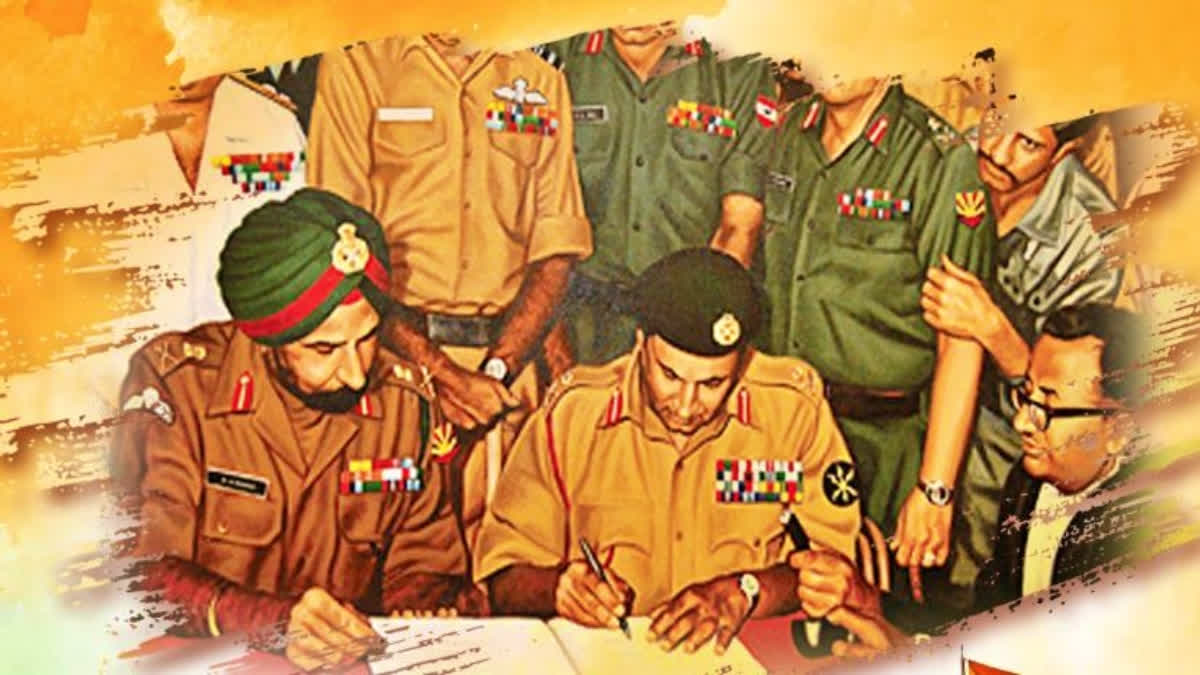Hyderabad: Vijay Diwas, observed annually on December 16, holds profound significance as it marks the triumph of the Indian armed forces over Pakistan in the 1971 war, leading to the carving out of Bangladesh. This day is dedicated to honouring the soldiers who made the ultimate sacrifice to protect the nation.
History- The historical context of Vijay Diwas lies in the 13-day conflict that commenced on December 3, 1971, leading to India's victory and the formation of Bangladesh from what was once East Pakistan.
Background- In the aftermath of the partition from India, Pakistan was geographically split into East Pakistan and West Pakistan, with East Pakistan later becoming present-day Bangladesh. The regional linguistic and cultural disparities, compounded by political, economic, and social tensions, led to a divided nation. The 1971 India-Pakistan war was a turning point, resulting in the surrender of the Pakistani Army to the Indian Army on December 16, 1971 and the subsequent formation of Bangladesh.
India's diplomacy- Indira Gandhi, the then-Prime Minister of India, showed exceptional diplomacy during the war, leading to the creation of Bangladesh within 25 years of Pakistan's establishment. The war, marking its 52nd anniversary in 2023, witnessed India's victory under the leadership of Indira Gandhi and Chief of Army Staff General Sam Manekshaw.
West and East Pakistan- The conflict arose from West Pakistan's repressive policies towards East Pakistan, causing widespread human suffering and subsequently leading to over 10 million refugees fleeing to India. Despite exhausting diplomatic options, India engaged in military action after Pakistani air strikes on Indian air bases on December 3, 1971. The Indian Armed Forces executed a brilliant strategy, defeating the Pakistani army in a mere 14 days.
Pakistan's surrender to India- On December 16, 1971, about 93,000 Pakistani soldiers surrendered to India, which resulted in the liberation of Bangladesh. This historic event marked the first time in war history that such a large number of soldiers had admitted defeat. During this surrender, Pakistan lost a significant portion of its navy and air force.
The toll on both sides- The Indian Army captured 15,000 square kilometres of Pakistani territory on the western front, leading to the fall of the Yahya Khan administration in Pakistan and the appointment of Zulfikar Ali Bhutto as President. The war took a toll on both sides, with 2,908 Indian soldiers killed and over 1,200 injured. Numerous officers and soldiers were decorated with gallantry awards, including four Paramvir Chakras, 76 Mahavir Chakras, and 513 Vir Chakras.
Key figures in the war's outcome-
Indira Gandhi- The then Prime Minister of India, Indira Gandhi played a crucial role in breaking Pakistan and establishing Bangladesh.
R N Kao- Head of India's external intelligence agency RAW, R N Kao was instrumental in the war and earned the title 'Architect of Bangladesh.'
Mujibur Rahman- Rahman was a key figure behind the Bangladesh Liberation Movement and the founding joint secretary of the East Pakistan Muslim Students League.
Yahya Khan- The President of Pakistan whose actions precipitated a civil war and ultimately led to the creation of Bangladesh. His defeat resulted in his resignation.
Sam Manekshaw- Sam Manekshaw, Chief of the Army Staff during the 1971 war, played a crucial role in India's success and became the first Indian Army officer to attain the rank of Field Marshal. He is widely recognised as the architect of India’s victory in the conflict. A cinematic portrayal of his life, titled "Sam Bahadur," featuring Vicky Kaushal as Manekshaw, was recently released.
The nation observes Vijay Diwas as a day of remembrance, honouring the courage, sacrifice, and bravery of the soldiers who fought in the 1971 war. The victory not only established the independence of Bangladesh but also solidified India's position worldwide.



